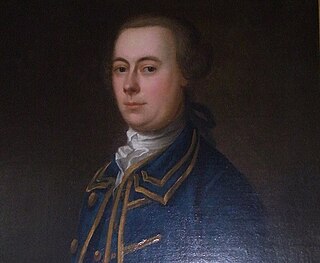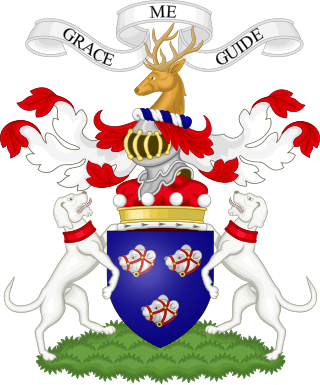Contents
| |||||
| Centuries: | |||||
|---|---|---|---|---|---|
| Decades: | |||||
| See also: | List of years in Scotland Timeline of Scottish history 1745 in: Great Britain • Wales • Elsewhere | ||||
Events from the year 1745 in Scotland .
| |||||
| Centuries: | |||||
|---|---|---|---|---|---|
| Decades: | |||||
| See also: | List of years in Scotland Timeline of Scottish history 1745 in: Great Britain • Wales • Elsewhere | ||||
Events from the year 1745 in Scotland .

The Battle of Culloden took place on 16 April 1746, near Inverness in the Scottish Highlands. A Jacobite army under Charles Edward Stuart was decisively defeated by a British government force commanded by the Duke of Cumberland, thereby ending the Jacobite rising of 1745.

The Battle of Prestonpans, also known as the Battle of Gladsmuir, was fought on 21 September 1745, near Prestonpans, in East Lothian, the first significant engagement of the Jacobite rising of 1745.

Sir Harry Munro, 7th Baronet was 25th Baron and the 28th chief of the Clan Munro. He was a Scottish soldier and politician. He was loyal to the Hanoverian dynasty and served as a captain in Loudon's Highlanders Regiment 1745–48.

The Battle of Clifton Moor took place on the evening of Wednesday 18 December during the Jacobite rising of 1745. Following the decision to retreat from Derby on 6 December, the fast-moving Jacobite army split into three smaller columns; on the morning of 18th, a small force of dragoons led by Cumberland and Sir Philip Honywood made contact with the Jacobite rearguard, at that point commanded by Lord George Murray.

Archibald Cameron of Lochiel was a Scottish nobleman, physician, and prominent leader in the Jacobite rising of 1745. He was the personal physician of Charles Edward Stuart and appears in the Jacobite Army muster roll as "ADC to the prince." Dr Cameron was the younger brother of Donald Cameron of Lochiel, who led Clan Cameron in the rising, and outlawed Roman Catholic priest Alexander Cameron. After secretly returning to Scotland in 1753, he was captured by the government with the aid of "Pickle the Spy" and, at Tyburn, he became the last Jacobite to be executed for high treason. He was eulogised in the Scottish Gaelic bardic poetry of the era and, in popular memory, he is sometimes referred to as Doctor Archie.
Events from the year 1745 in Great Britain.
Events from the year 1746 in Great Britain.

Clan Forbes is a Highland Scottish clan from Aberdeenshire, Scotland.

The Battle of Littleferry took place during the Jacobite rising in 1746, just before the Battle of Culloden. Scottish forces loyal to the British-Hanoverian Government defeated a Scottish Jacobite force.

The Jacobite rising of 1745 was an attempt by Charles Edward Stuart to regain the British throne for his father, James Francis Edward Stuart. It took place during the War of the Austrian Succession, when the bulk of the British Army was fighting in mainland Europe, and proved to be the last in a series of revolts that began in March 1689, with major outbreaks in 1715 and 1719.

The Manchester Regiment was a Jacobite unit raised during the 1745 Rebellion and the only significant number of English recruits willing to fight for Charles Edward Stuart in his attempt to regain the British throne for his father. Raised in late November 1745, the majority were captured in December at Carlisle; eleven officers and sixteen members of the rank and file were executed in 1746, over a quarter of all those executed for their role in the Rising.
John Roy Stewart or Stuart or Stiuart (1700–1752) was a distinguished officer in the Jacobite Army during the rising of 1745 and a war poet in both Gaelic and in English.

The Skirmish of Tongue was a battle that took place in March 1746 near Tongue in the Scottish Highlands during the Jacobite Rising of 1745.
The Independent Highland Companies were irregular militia raised from the Scottish clans of the Scottish Highlands by order of the Scottish government between 1603 and 1760 in order to help keep the peace and enforce the law in the Highlands and were recognized as such by the government. The officers of the Independent Highland Companies were commissioned as officers of the British Army but the independent companies were not recognized as official regiments of the line of the army. The Independent Highland Companies were the progenitors of the Highland Regiments of the British Army that began when ten Independent Highland Companies were embodied to form the Earl of Crawford's Highland Regiment that was numbered the 43rd Regiment of Foot in 1739.
Events from the year 1746 in Scotland.
George Mackay, 3rd Lord Reay (1678–1748), was a Scottish noble and chief of the Clan Mackay, a Scottish clan of the Scottish Highlands. During his life the Glorious Revolution took place which directly affected his family and estate, and during his chiefdom he served the British-Hanoverian Government during the Jacobite rising of 1715 and the Jacobite rising of 1745.

The Seven Men of Moidart, in Jacobite folklore, were seven followers of Charles Edward Stuart who accompanied him at the start of his 1745 attempt to reclaim the thrones of Great Britain and Ireland for the House of Stuart. The group included English, Scots and Irish subjects of varying backgrounds linked mostly by their involvement in pro-Stuart intrigues. Although some had military experience, most of the men were relatively elderly by the standards of the time; some were already infirm and little suited to the rigours of campaigning.

The siege of Culloden House took place on the night of 15/16 October 1745 and was part of the Jacobite rising of 1745. 200 men of the Jacobite Clan Fraser of Lovat attempted to capture Duncan Forbes, Lord Culloden who was the Lord President of the Court of Session, the most senior legal officer in Scotland.

Duncan Forbes 5th of Culloden was a Scottish lawyer and Whig politician who sat in the House of Commons from 1721 to 1737. As Lord President and senior Scottish legal officer, he played a major role in helping the government suppress the 1745 Jacobite Rising.

An Incident in the Rebellion of 1745 is an oil painting painted by Swiss-born artist David Morier sometime between 1746 and 1765. It is currently part of the art collection of the British royal family. The painting depicts a scene during the 1746 Battle of Culloden, in which a group of Jacobite Army troops charge against a line of British government soldiers.